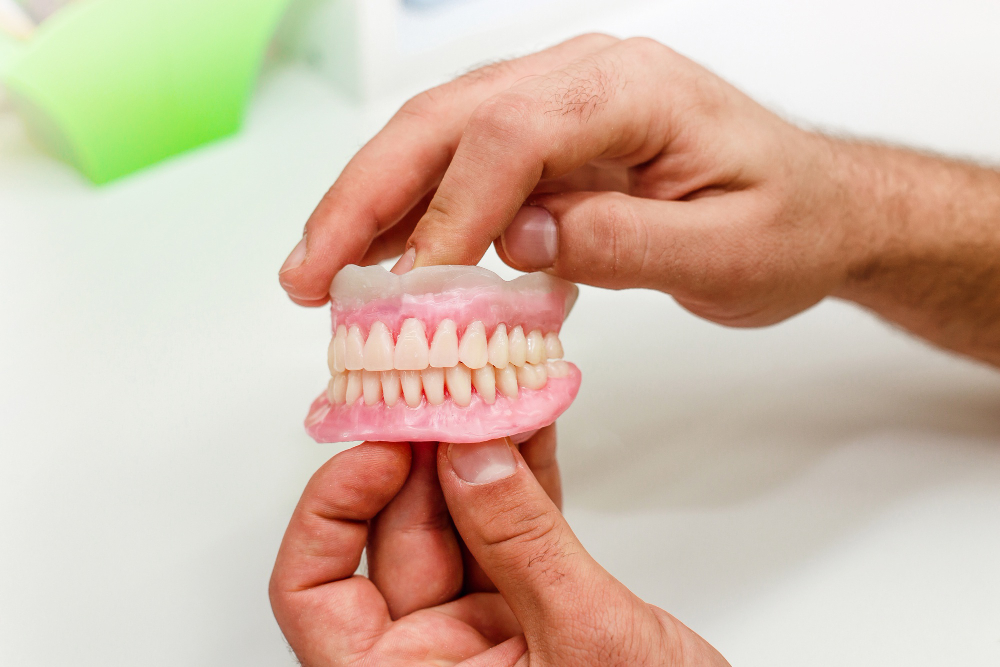
A Beginner’s Guide to Dentures: Everything You Need to Know
If you’ve lost your natural teeth, it can be a difficult experience, but modern dentistry has produced an answer. Dentures are a reliable and cost-effective way to restore both your smile and confidence. You may already have some framework for considering your denture options, or possibly, you’re just learning about them for the first time. This guide to dentures will cover everything from descriptions of the different types of dentures, care tips, facts about dentures, and much more.
Types of Dentures and How to Determine a Type for You
There are different types of dentures, so there isn’t a perfect answer for what is “the right denture”. Ultimately the type of denture that is right for you will depend on the dental condition you are facing, your financial situation, and your lifestyle.
1. Full Denture
The Full dentures are for dental patients that have lost all of their natural teeth on the upper teeth or lower teeth. Full dentures are made to rest on the gums and have suction or adhesive to keep them in place.
2. Partial Denture
Partial dentures are for people that may still have some healthy, usable natural teeth. Partial dentures fill in the gaps and will normally clip to the natural teeth for support.
3. Immediate Denture
Immediate dentures are placed after the teeth are extracted, allowing the patient to. These are usually just temporary until the gums heal and the permanent dentures are complete.
4. Implant-Supported Denture
The implant-supported denture is not a denture that will replace missing tooth. Instead, it will depend on dental implants that are surgically placed.
Choosing the right type involves a conversation with your dentist, who will evaluate your oral health and guide you toward the best solution for comfort, function, and aesthetics.
How Dentures Are Created and Fitted
Getting dentures done is not a same-day process, rather it involves several steps to ensure a perfect fit.
Step 1: The Consultation and Impressions
Your dentist will look inside your mouth, take impressions of your gums and teeth if you have remaining teeth, and discuss your concerns, needs, and desires.
Step 2: The Wax Try-Ins
The wax model will be made, and you will try this in to determine the fit and look of the denture. There may be adjustments made to the wax model to ensure comfort and aesthetics.
Step 3: Laboratory Construction
Once all posters are approved, your final dentures will be constructed in a dental laboratory using a selection of materials, typically acrylic resin for full denture, porcelain for partial denture-that replicate the appearance of natural teeth, or a mixture of acrylic and porcelain, for fixed bridge work.
Step 4: Final Fitting and Adjustments
After placement of denture, the dentist will make fine adjustments to fit to avoid sore spots or irritation, and other adjustments after a day or two may be necessary. Follow-up appointments will be required to ensure the dentures fit well.
H2: How to Care for Your Dentures for Longevity
Proper care can extend your life life and keep your mouth healthy:
• Daily cleaning: Brush your prosthesis with a soft-brusal toothbrush and dentor cleanser to remove food particles and plaque.
• Soaking Overnight: Save them in a bulklining solution or regular water when not in use to dry and prevent war.
• Handles with care: The prosthesis can be broken, so handle them on a soft surface or towel.
• Oral hygiene: Even if you use full dentures, clean the gums, tongue and any remaining teeth daily to prevent irritation or infection.
• Regular dental control: Your dentist will examine appropriate fit and monitor oral health, adjust the prosthesis as needed.
Troubleshooting Common Denture Issues
It is normal to experience a short adjustment period when using a prosthesis, but how to handle common challenges here:
• Discomfort or anguish: New dentures can feel heavily or cause mild irritation. Your dentist can make adjustments to relieve pressure stains.
• Difficulty talking or eating: Practice talking slowly and starting with soft foods. Over time, your muscles will be beneficial.
• Loose or slide: If your prosthesis when talking or chewing, glue can help but frequent loose should be addressed by your dentist.
• Further saliva: It is common at first, but usually solves by adjusting the mouth.
H2: How Dentures Can Improve Quality of Life
Danchers do more than change the missing teeth only-can have significant effects on your physical and emotional welfare:
- Restored appearance: They support face muscles and help you look young and healthy.
- Better work: You will be able to eat and talk easier than living with missing teeth.
- Increased self confidence: A full smile can dramatically improve self -confidence in both social and professional surroundings.
- Better nutrition: Dancher makes it easy to eat different types of foods and supports general health.
The thought of getting dentures can be intimidating, but they are a reliable and tried-and-true alternative that can increase your comfort, wellness, and appearance. A good fit and taking good care of your dentures can help you feel confident and smile freely again.
If you are thinking about getting dentures, or if you need help deciding on one-type or the other type is right for you, ask your dentist – they are your best ally on the path to developing a smile that looks and feels great.

